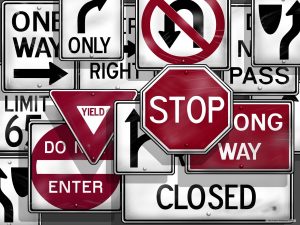Many motorists will be pulled over by a police officer at least once in their lives, perhaps at a DUI checkpoint or as the result of a speed trap. While traffic stops often are carried out for relatively minor violations such as speeding or running a red light, it’s important for citizens to understand the Fourth Amendment right against unlawful search and seizure and other aspects of the law pertaining to traffic stops.
Getting Pulled Over
A traffic stop can be stressful and emotional, but some simple considerations can help reduce the chance of trouble and prevent new issues from arising. When you are pulled over you should do so safely and quickly, letting the officer know that you are complying. Use your signal and pull onto the shoulder as far as you can. It is important to remain calm and polite, even if the police officer is not.
After you have come to a stop you should roll down your window, turn off the car engine, and place your hands on the steering wheel. Turn on the interior light, if it is night, and do not retrieve documents until you are asked to do so. Rummaging in the glove box or elsewhere as the officer approaches may be interpreted as an attempt to stash contraband or retrieve a weapon.
Stay in the car unless the officer asks you to get out of the vehicle. If you exit the vehicle before being asked the officer may think you are getting ready to flee or fight. If you are asked to exit the vehicle do so calmly and carefully. The officer may pat you down for a weapon and remove a suspicious object.
It is generally best to let the officer do most of the talking and to avoid incriminating yourself. It may be important to be polite, but staying silent is a right and is better than incriminating yourself.
Vehicle Searches
In some situations the police will want to search your vehicle. They are not permitted to do this during most traffic stops. A police officer needs a valid reason to search a vehicle, or the permission of the driver. If the officer sees you hide or throw an item they may search your car. Hunching down in your seat may make them think you are hiding something. The officer can frisk you if they have a reason to think you are armed, dangerous, or involved in criminal activity.
A police officer can search your vehicle if they have probable cause to believe you or your passengers are involved in criminal activity. The “plain view” doctrine permits a search where contraband or other evidence of criminality is in plain view. Open alcohol containers, drug paraphernalia, and other items out in the open can result in a search of your vehicle. If you or any passenger in the car is arrested the vehicle may be searched. If you are arrested the car will be towed and an “inventory” search of the contents may be conducted without any other proof of wrongdoing.
If an officer asks to search your car without a warrant you may refuse or simply remain silent. You should avoid arguing with the officer, but you should also not agree to the search. If you agree the search is lawful, but unless there was probable cause for the search any evidence an officer uncovers searching a vehicle without consent is excluded from court and cannot be used to convict you.

